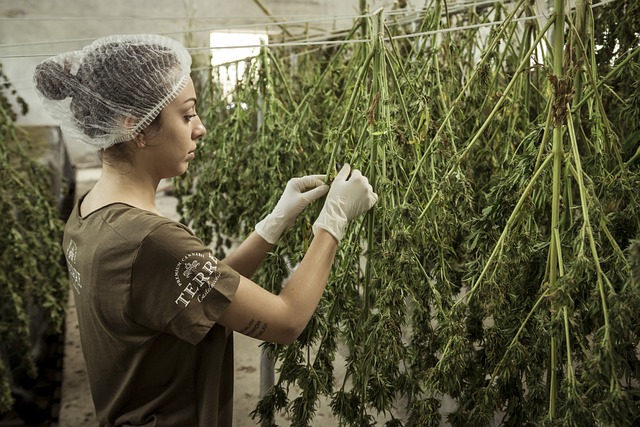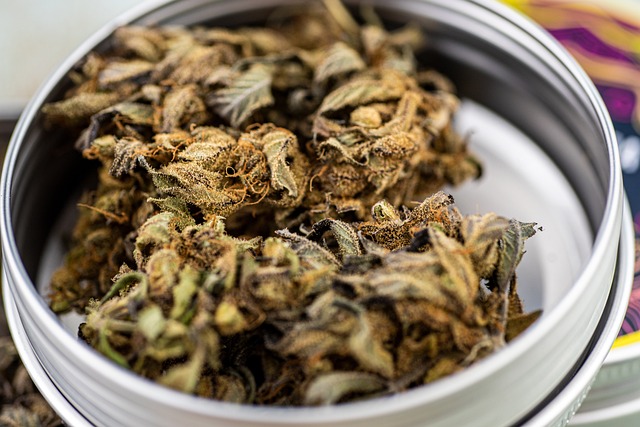As the popularity of cannabidiol (CBD) products grows, Heavy Metals Testing for CBD is vital to ensure product safety. This rigorous process detects harmful heavy metals like lead, mercury, and arsenic using advanced lab techniques like ICP-MS. Mandatory labeling, backed by global regulatory changes, requires transparent reporting on product labels, empowering consumers to make informed choices and fostering trust in the market. Manufacturers are adopting voluntary standards and third-party testing to meet evolving legal requirements and consumer expectations for safe CBD products. By minimizing heavy metal contamination through soil testing and water treatment, Heavy Metals Testing for CBD protects consumers and enhances brand reputation.
In recent years, the rise in popularity of cannabidiol (CBD) products has led to a growing need for stringent safety measures. One such measure gaining traction is mandatory labeling, particularly regarding heavy metals testing. This article delves into the importance of heavy metals analysis in CBD, exploring current regulations and the challenges they face. We’ll uncover common metal contaminants in cannabis sativa plants and discuss innovative solutions like advanced testing methods. By implementing transparent heavy metals reporting, manufacturers can ensure consumer safety and build trust in the market.
Understanding Heavy Metals Testing in CBD Products

In recent years, as the demand for cannabidiol (CBD) products has surged, ensuring product safety and quality has become paramount. One critical aspect often overlooked but crucial to consumer health is Heavy Metals Testing for CBD. This process involves meticulous analysis to detect any presence of heavy metals like lead, mercury, and arsenic, which can be harmful if ingested in significant amounts. Given the intricate nature of CBD extraction processes, these contaminants may inadvertently find their way into the final product.
Heavy Metals Testing for CBD is, therefore, a critical step in assuring product purity. Advanced laboratory techniques, such as Inductively Coupled Plasma Mass Spectrometry (ICP-MS), enable precise detection levels, ensuring that consumers receive safe and high-quality CBD products. This testing not only safeguards public health but also builds consumer confidence, allowing them to make informed choices about their wellness regimens.
The Role of Mandatory Labeling in Ensuring Safety

Mandatory labeling plays a pivotal role in ensuring safety, especially in industries like CBD (Cannabidiol) where products containing heavy metals require rigorous testing. This testing is crucial to guarantee that consumers are protected from potential health risks associated with contaminated CBD goods. By mandating clear and accurate labeling, regulatory bodies ensure that manufacturers provide comprehensive information about their products’ metal content, including any traces of heavy metals like lead, mercury, and arsenic. Such transparency empowers consumers to make informed decisions, choosing only those brands committed to quality and safety.
Moreover, mandatory labeling for Heavy Metals Testing for CBD helps in identifying potential sources of contamination. It encourages manufacturers to implement stringent quality control measures during production, including regular testing at various stages. This proactive approach not only enhances product safety but also builds consumer trust, fostering a market where high-quality, metal-free CBD products become the norm.
Current Regulations and Standards for Metal Contaminants

The current landscape of regulations and standards regarding metal contaminants, particularly in the context of Heavy Metals Testing for CBD, is evolving rapidly. Currently, there’s a lack of universal consensus on specific limits for heavy metals in CBD products, leaving consumers and manufacturers uncertain about safety guidelines. However, many regions are adopting stringent measures to ensure product quality and safety. For instance, some countries require thorough testing for lead, mercury, and arsenic in CBD oils and extracts to prevent potential health risks associated with these heavy metals.
Industry standards are pushing towards more rigorous Heavy Metals Testing for CBD to address consumer concerns. Organizations like the U.S. Food and Drug Administration (FDA) have been vocal about their efforts to establish guidelines that protect public health. These regulations aim to maintain the integrity of the CBD market, ensuring products are safe for consumption. As awareness grows about the potential presence of heavy metals in CBD, manufacturers are increasingly adopting voluntary standards and third-party testing to meet consumer expectations and stay ahead of evolving legal requirements.
Why is Heavy Metals Testing Necessary for CBD?

Heavy metals testing is crucial for ensuring the purity and safety of CBD (Cannabidiol) products. CBD is derived from hemp, a variant of the Cannabis sativa plant, which can naturally accumulate heavy metals like lead, mercury, and arsenic from soil, water, and air pollution. Even trace amounts of these contaminants can pose significant health risks to consumers. Therefore, mandatory labeling and rigorous Heavy Metals Testing for CBD are essential to protect users from potential exposure to these toxic elements.
This testing process plays a vital role in navigating the complex landscape of CBD product quality. It helps verify that the products on the market meet safety standards, providing assurance to consumers who rely on CBD for various purposes, including pain management, anxiety relief, and sleep aid. By implementing such testing and requiring transparent labeling, regulatory bodies can foster trust among consumers and encourage the development of high-quality, safe CBD products.
Common Sources of Heavy Metals in Cannabis Sativa Plants

Cannabis Sativa plants, like many others, can accumulate heavy metals from their environment, which raises concerns about potential contamination in the final product, especially with the growing popularity of CBD products. Common sources of heavy metals in cannabis include soil and water contaminants. For instance, lead, mercury, and cadmium can enter the plant through polluted soil or water used for irrigation. These metals can then bioaccumulate in different parts of the plant, including the flowers and leaves where the majority of cannabis is harvested.
Heavy metals testing for CBD products has become increasingly important to ensure consumer safety and maintain product quality. Given that heavy metals have no therapeutic benefits and can potentially cause adverse health effects, it’s crucial to implement rigorous testing protocols at every stage of cannabis production. This includes regular soil testing, water treatment, and monitoring during cultivation, as well as post-harvest processing and packaging to minimize the risk of heavy metal contamination in CBD products.
Implementation Challenges and Solutions for Mandatory Labeling

Implementing mandatory labeling standards, particularly for products like CBD with potential heavy metal contaminants, presents several challenges. Ensuring accuracy in testing and transparent communication of results is paramount. Labs must be equipped to handle the specific analysis of heavy metals in CBD extracts, which may require specialized equipment and trained personnel. Standardization of testing methods across laboratories is crucial to guarantee consistent and reliable data.
One solution lies in establishing collaborative efforts between industry stakeholders, regulatory bodies, and testing facilities. Developing clear guidelines and protocols for Heavy Metals Testing for CBD ensures all parties understand the required procedures and expectations. Additionally, implementing quality control measures and regular inter-lab comparisons can enhance data integrity. Educating consumers about the importance of such labeling and empowering them to make informed choices by understanding product certifications further reinforces the impact of mandatory labeling initiatives.
Benefits of Transparent Heavy Metals Reporting on Labels

In today’s market, where transparency and consumer awareness are at an all-time high, mandatory labeling becomes a powerful tool to ensure trust and safety in the CBD industry. One significant aspect that requires attention is Heavy Metals Testing for CBD products. By implementing transparent heavy metals reporting on labels, manufacturers offer consumers valuable insights into the purity and quality of their purchases. This practice empowers buyers to make informed decisions, knowing exactly what is—or isn’t—present in their supplements.
Such labeling provides numerous benefits, including increased consumer confidence, improved product safety, and enhanced brand reputation. It allows individuals to verify that their CBD products are free from potentially harmful heavy metals like lead, mercury, and arsenic, which can have adverse effects on health. Moreover, transparent reporting fosters a sense of accountability among producers, encouraging adherence to strict quality control measures, thereby revolutionizing the industry’s standards.
Future Prospects: Enhancing Safety with Advanced Testing Methods

As the market for cannabidiol (CBD) continues to expand, ensuring product safety and quality through rigorous testing becomes increasingly vital. Future prospects in this industry hold immense potential for enhanced safety measures, particularly with the advent of advanced testing methods for heavy metals. These cutting-edge techniques are set to revolutionize the way CBD products are regulated and monitored. By employing sophisticated instrumental analysis and detection methods, manufacturers can guarantee that their CBD oils, tinctures, and other derivatives are free from any trace elements of heavy metals, which could be harmful to consumers.
The implementation of advanced Heavy Metals Testing for CBD is a game-changer in terms of consumer protection. It enables brands to maintain the highest standards of quality control, fostering trust among customers who prioritize their health and well-being. This shift towards more stringent testing methods not only ensures the safety of CBD products but also positions the industry for greater transparency and regulatory compliance, paving the way for a more robust and reputable market.
